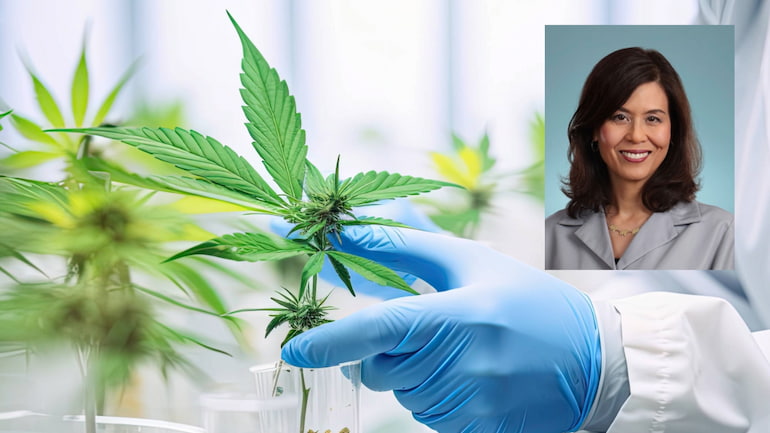“Hints” are emerging that research into cannabis as medicine will soon increase, along with the chance cannabis will finally be removed from a list of drugs labelled with no medical use.
That’s the opinion of Dr. Leslie Mendoza Temple, former head of Illinois’ Medical Cannabis Advisory Board and director of integrative medicine for the NorthShore University HealthSystem in Glenview, Ill.
Temple also believes America is at a “tipping point” in recognizing cannabis as an “adult use substance” like alcohol, tobacco, and other products legal for people 21 and older.
“Right now, we’re in this disjointed space where 27 states have laws that make cannabis legal for medical, recreational or both,” said Temple, who is also a listed expert with Doctors For Cannabis Regulation, now Doctors for Drug Policy Reform. “That’s more than half the country. So what’s it going to take for the rest of the country? A federal mandate that we’re taking cannabis off of Schedule 11 status.”
Temple describes herself as an “early adopter” of cannabis as medicine and “a religious Christian who has a strong clinical experience of this substance’s therapeutic properties.”
She committed herself to learning about cannabis after Illinois legalized medical cannabis in 2013. Temple realized that many of her patients’ conditions were on the list of those eligible for medical marijuana treatment.
So she studied as much of the research as she could possibly find, led the state’s top medical cannabis panel from 2016 to 2017, and now considers cannabis “just like any other pharmaceutical that has risks and benefits, period.”
Iowa is among only 11 states where cannabis in its flower form remains illegal. Illinois, by contrast, is among the 21 states where cannabis is fully legal. Illinois also allows medical marijuana patients to grow their own plants.
Temple’s Key Points:
• Recent calls for proposals from the National Institutes of Health (NIH) are the “hints” to which Temple is referring. Late last year, the NIH called for public feedback on possible clinical studies of cannabis. The government also called for 8,800 pounds of research cannabis (equivalent to 12.5 million joints) over five years, reports Marijuana Moment. Another government agency announced it would put $1.5 million toward cannabis studies.
“The lack of research is what has been holding back many physicians, and the health care community, from accepting this broadly available substance,” she says. “We need randomized controlled trials. You have a lot of minds to change, and science is what‘s going to change those minds. And science costs money.”
• Chronic and severe pain, recovery from opioid dependence, and potential to relieve long COVID are among the areas where Temple believes research is most promising. She’d like to see more studies comparing cannabis to vicodin and other pain relievers. Also, “in substance use, it is sometimes considered a harm reduction tool. I’d love to see, (through studies) if people step away from heroin and alcohol and use cannabis instead, will we see better outcomes? Will it cost less to the system?”
• Today’s doctors should be required to study cannabis just like any other drug, Temple says. She believes all medical schools should include education on the “socio-political context” of cannabis too, and the racist “underpinnings” that surround its stigmatization.
In fact, Temple is working with colleagues from Ben Gurion University of the Negev in Israel and George Washington University to draft a medical school curriculum about cannabis.
“If a physician is comfortable prescribing benzos, opioids and other potentially psychotropic medications, we need to study cannabis the same way as another substance in the toolbox. Move away from the stigma, and the emotional reasons, that are keeping us from opening our minds to this possibility. This stuff has been around for thousands of years.”
• Though recreational and medical cannabis are separated legally, Temple says for many marginalized communities, recreational cannabis IS medical cannabis. “For people who don’t have the means financially to get a (medical marijuana) verification, or a physician they can access, they may have a medical intention, but are buying it as a recreational customer.”
Without legal recreational cannabis, people may continue turning to the “legacy market” for cannabis, which may intersect with other dangers of underground drug sales like fentanyl contamination.
The potential for abusing cannabis remains a concern, especially among youth, who should never use cannabis except in supervised medical situations, Temple says. Also, research shows 9 percent of the general population will develop an addiction to cannabis.
For states like Iowa that still have no legal access to cannabis, Temple recommends focusing on decriminalization. Meanwhile, she believes the NIH’s increased funding and call for research proposals are cause for practical optimism.
“We’re much better off than we were five years ago,” she says. “This ‘opening up’ of the money gates and the brain power that could really launch the science we’re looking for would be amazing.z”


